
Last-modified: November 28, 2001
Copyright © 1993-2001 Vinit Carpenter -- All rights reserved
|
|
 |
Introduction:
- This is a list of a few C and C++ language tutorials available to a user.
This list will include interactive tutorials, public-domain code collections,
books etc. I've developed this FAQ purely as a volunteer effort as a service
to the Internet community. Although every effort has been made to insure that
all the information here is as accurate as possible, no guarantee is implied
or intended.
I welcome comments, suggestions or criticism for all the people out there on the net that read this. If you can help me make this list a little better, you will be helping a lot of people out there on the net. I am a horrible writer and an even worse speller. If you find any errors or would like to suggest any additions please feel free to email me at the address below:
Some of the items discussed here are platform-dependent, but most of the items are applicable across all platforms (portable). If you have any comments, suggestions, complaints, additions, etc, please feel free to e-mail me at the following address:
If you are working on a tutorial or would like something added to this list, please e-mail me at the address given above. I must note that I haven't been looking for or adding new resources since about 1996. I discovered Java and have since been putting all my energies into learning and teaching Java. But I've tried to make sure that all the links are current and so if you notice something wrong, just let me know.
The Origins of C and C++:
- The 'C' programming language was originally developed for and implemented
on the UNIX operating system, on a DEC PDP-11 by Dennis Ritchie. One of the
best features of C is that it is not tied to any particular hardware or
system. This makes it easy for a user to write programs that will run without
any changes on practically all machines. C is often called a middle-level
computer language as it combines the elements of high-level languages with the
functionalism of assembly language.
C allows the manipulation of bits, bytes and addresses- the basic elements with which the computer functions. Another good point about C is its portability which makes it possible to adapt software written for one type of computer to another. C was created, influenced, and field tested by working programmers. The end result is that C gives the programmer what the programmer wants. C offers the speed of assembly language and the extensibility of FORTH, but few of the restrictions of Pascal and Modula-2.
C++ is an enhanced version of the C language. C++ includes everything that is part of C and adds support for object-oriented programming (OOP). In addition, C++ also contains many improvements and features that make it a "better C", independent of object oriented programming. C++ is actually an extendible language since we can define new types in such a way that they act just like the predefined types which are part of the standard language.
If you just use C++ as a better C, you will not be using all of its power. Like any quality tool, C++ must be used the way it was designed to be used to exploit its richness. Some of the new features include encapsulation, inline function calls, overloading operators, inheritance and polymorphism. I am not going to explain what they mean here as that would simply take me away from my purpose here, but you can refer to any good C++ book or the C++ FAQ for more information.
What do you need to get started?
- UNIX SYSTEM:
Type cc at the % prompt. If you don't get any error messages, you probably have a C compiler . If you get an error message, try acc, gcc or g++. If any of these don't work, contact your local system administrator and ask him/her to get you a C/C++ compiler. GNU C/C++ compiler is available from a lot of anonymous ftp sites free of charge. Look into it. (I've got g++ running on my Linux box without any problems)
- Windows/Linux (IBM COMPATIBLES):
There are a lot of good compilers available to you. Check out this list for a ton of free and shareware compilers for the Windows platform. I can't recommand any of them as most of my C or C++ programming is now on my Linux PC with with Code Fusion. If you want a great 32 bit operating system, you should look into Linux. I've been a Linux user since early 93 when the kernel was 0.99 or 0.97 and Slackware and SLS were the only distributions. Anyone remember those days?? :)
If you're serious about Linux, start by getting a copy of Running Linux by Matt Welsh. This is really a great book and will give you a great start. You can also start by getting a copy of RedHat, Caldera, Slackware or Debian Linux and starting off that way. You can also start by getting a new PC from DELL with Linux pre-installed. I don't own any stock in DELL, I just love their PC's. In fact, I don't own any stocks of RedHat either as I was screwed by E-trade like all of the other people that got their special invitation from RedHat.
- OpenVMS (VAX & AXP):
If you're on a VAX, type in CC to check and see if you have a C compiler. VAX C is not the best compiler around, but it certainly does the job. If you don't have a C compiler, look into the GNU C/C++ compiler GCC. You can get the VAX version of GCC from ftp.spc.edu via anonymous ftp. If on a AXP system, you should have access to DEC C/C++. Please contact your local system administrator or computer consultant for more site specific questions.
- Macintosh (Apple/PowerMac):
- There are three main players in the Mac compiler market: MPW (from
Apple), THINK C / Symantec C++ (both from Symantec), or CodeWarrior (from
Metroworks): THINK C is $225 (only a C compiler), while Symantec C++ is $375
(includes C and C++ compilers). CodeWarrior comes in three versions: bronze,
silver, and gold, at $199/299/399, respectively. Bronze generates 68K code,
silver generates PowerPC code, and gold generates both. All three versions
include C, C++, and Pascal compilers. The Symantec C++ compiler (ver 7.0)
can be bought with a cross-compiler for the PowerMac.
There have been two attempts at freeware/shareware Mac C compilers: Sesame C and Harvest. Harvest C was an ambitious attempt at a production-quality freeware compiler which was later abandoned by the author.
Tutorials:
To retreive a tutorial off this list, simply select its filename.- Title: A C tutorial.
Filename:C-LESSON.ZIP (ftp://garbo.uwasa.fi/pc/c-lang/c-lesson.zip)
Author: Christopher Sawtell.
E-mail: chris@gerty.equinox.gen.nz
URL: ftp://garbo.uwasa.fi/pc/c-lang/c-lesson.zipThis tutorial contains a complete course for you to learn the 'C' computer language itself. Some knowledge, of computers and the jargon is assumed, but complicated concepts are fully explained. This tutorial is geared towards the UNIX operating system, but everything discussed here applies across all platforms. Most of the source code included here compiles under all the platforms. This is a good effort and is worth your time. Updates to this tutorials are posted to the USENET group comp.lang.c.
- Title: Coronado;s Generic C tutor v2.0
Filenames: http://www.coronadoenterprises.com/, http://www.coronadoenterprises.com/
Author: Gordon Dodrill
E-mail: --
URLs: ftp://ftp.simtel.net/simtelnet/msdos/c/gencsrc.zip, ftp://ftp.simtel.net/simtelnet/msdos/c/genctxt.zipThis is one of the most complete tutorials out there. Once again, most of the items covered here are apply across all platforms. There are some items discussed here that are DOS dependent. The tutorial includes a manual that covers all the aspects of the C language. The archive also includes a huge collection of C code that is discussed in this tutorial. The best way to learn anything is by practical application and this tutorial does just that. A payment of $10.00 is requested by the author if you find the tutorial helpful, but the payment is not required. I think you should send in the $10.00 as a lot of time and effort went into this project.
- Title: Thread An On-Line C Help File V 1.01
Filename: THREAD.ZIP (ftp://ftp.simtel.net/simtelnet/msdos/c/thread.zip)
Author: Fran Horvath
E-mail: --
URL: ftp://ftp.simtel.net/simtelnet/msdos/c/thread.zipThread is a C language help utility. It was written by a member of the U.S.D.A. Grad School faculty to help students learning the C language. Thread is a variable record-length database, together with an index, that enables the fast lookup and display of C keywords, standard library functions, and other items. There are a few important functions missing from this help utility, but it is still a pretty good resource. Give it a shot.
- Title: Collection of C-Snippets
Filename: SNIP9510.ZIP (ftp://ftp.brokersys.com/pub/snippets/snip9707.zip)
Author: Bob Stout
E-mail: bobstout@neosoft.com
URL: http://www.snippets.org/This is the July 97 release of one of the biggest public domain/freeware portable C code and instruction text. According to the author, the 1.1 MB archive contains over 360 files and approximately 35% of it is PC-specific. The rest of it is completely portable. There is a piece of code for every single task starting with macros to complete cut-and-paste C code solution and utilities, along with some frequently asked questions and instructional files. This archive is a must for every programmer.
- Title: COMP.LANG.C FAQ
Filename: FAQ
Author: Steve Summit
E-mail: scs@eskimo.com
URL: http://www.eskimo.com/~scs/C-faq/top.htmlThe FAQ (Frequently Asked Questions) is a compilation of frequently- asked questions of the usenet group, COMP.LANG.C along with the answers. Steve's put in a lot of work and this compilation shows it. I found that the FAQ answered a lot of my questions. I even learned a lot of new things browsing through the document. I think this FAQ should should be on your computer desk right next to a good C programming book. The FAQ is posted to COMP.LANG.c and news.answers every month along with the diff version.
- Title: TUTOR v3.10
Filename: CTUTORDE.ZIP (ftp://ftp.simtel.net/simtelnet/msdos/c/ctutorde.zip)
Author: Gordon Dodrill
E-mail: rowe@netcom.com
URL: ftp://ftp.simtel.net/simtelnet/msdos/c/ctutorde.zipThis is an educational learning tool which helps expedite the difficult process of learning the C Programming Language. It includes a tutorial, style guide, and interactive quiz program all integrated together in one program. The tutorial covers both K&R version of C and ANSI C. One of the biggest limitation of this tutorial is that it is only available for DOS computers.
- Title: Programming in C
Filename: CE.html
Author: Dave Marshall
E-mail: Dave.Marshall@cm.cf.ac.uk
URL: http://www.cm.cf.ac.uk/Dave/C/CE.htmlThis is one of the best C programming tutorials out there on the World Wide Web (WWW). See tutorial #11 for more information on the web and tools to access the web. This tutorial starts out with some basic ideas and then extends to some more advanced features of C. With the popularity of the World Wide Web, items on the web servers are going to be very popular. This is really a great tutorial and worth checking out. Some of the items discussed here are loops, arrays, string manipulation, pointers, dynamic memory allocation, I/O, UNIX, C preprocessor and some exercises. While you're out there, check out Ceilidh, the online C tutoring system.
- Title: ANSI C for Programmers on UNIX systems.
Filename: love_C.ps.Z,love_C.shar (ftp://svr-ftp.eng.cam.ac.uk/misc/love_C.shar)
Author: Tim Love
E-mail: tpl@eng.cam.ac.uk
URL: ftp://svr-ftp.eng.cam.ac.uk/pub/misc/love_C.ps.ZThis is a really nice C tutorial geared towards people on UNIX system as the title would suggest. This document introduces C by providing sample programming tasks. One of the good things about this tutorial is that all the source code included is ANSI compliant. This tutorial also includes programming exercises to aid or gauge your progress as you go through the material (answers included in back). The tutorial covers some of the basics such as functions, pointers and string manipulation followed by some programming examples to apply the items you've just learned.
There is also a section on memory allocation that illustrates the use and dangers of malloc. The section on the Make utility helped me a lot as I really don't like make and makefiles. The section of debugging is also extensive and has some great tips. The appendix of this tutorial also has a section of converting from K&R to ANSI C. Really great job and well worth the checking into.
- Title: Coronado Enterprises C++ Tutorial (v2.20)
Filename: http://www.coronadoenterprises.com/, http://www.coronadoenterprises.com/
Author: Gordon Dodrill
E-mail: --
Phone: (505) 293-5464
URL: ftp://ftp.simtel.net/simtelnet/msdos/cpluspls/cptutt22.zip , ftp://ftp.simtel.net/simtelnet/msdos/cpluspls/cptutt22.zipJust like its C counterpart, this is really one of the best and most complete C++ tutorial out there. This tutorial is not for the person just starting out in programming as C++ is not an ideal first language. But if you are familiar with C or any other programming language, this tutorial will get you started with C++. All the source discussed in this tutorial is included and learning is really accelerated as you can compile the code while you are reading about it. This tutorial will assume a thorough knowledge of the C programming language and little time will be spent on the fundamental aspects of the language. Special attention has be devoted to explaining the newer additions as provided by the ANSI-C standard, as many programmers are used to the old K&R school of thought.
- Title: COMP.LANG.C++ FAQ
Filename: FAQ
Author: Marshall P. Cline, PH.D.
E-mail: cline@parashift.com
URL: http://www.cerfnet.com/~mpcline/C++-FAQs-Lite/Wow!!! That's really all I can say about this collection of questions and answers for C++ and Object Oriented Programming (OOP). This is the complete FAQ for the Newsgroups COMP.LANG.C++ compiled by Dr. Marshall Cline. I have been programming in C++ for a few months and am far away from being an 'expert', and this compilitation helped me enormously. Once again, this is not for the person that is starting to learn C++, but if you've already taken the first step, this FAQ is for you.
The C++ FAQ has been released as a book called `C++ FAQS -- Frequently Asked Questions' by Addison-Wesley. The book is a complete re-write and supposedly has a lot of new material. Marshall Cline is joined by Greg A. Lomow as the co-author of the book (ISBN 0-201-58959-3). I am not sure if the FAQ will still be posted to the comp.lang.c++. The FAQ will still be posted in the Newsgroup comp.lang.c++, but if you find the FAQ helpful, you should really buy the book.
- Title: C++ on the World Wide Web
Filename: C++.html
Author: Marcus Speh
E-mail: marcus@x4u.desy.de
URL: http://uu-gna.mit.edu:8001/uu-gna/text/cc/index.htmlThis is one of the award wining courses at the 1st WWW conference (congratulations Marcus. great job). One of the newest addition here is the Dorill C++ course converted to HTML. There is a wealth of information on C++ available on the World Wide Web (WWW). The World Wide Web (WWW) is a wide area hypermedia information retrieval system that gives the user universal access to a large universe of documents. One of the most popular to the Web is called Mosaic developed by NCSA. Mosaic is an Internet based global hypermedia browser that allows you to discover, retrieve and display documents and data from all over the world. Global hypermedia means that information located around the world is interconnected in an environment that allows you to travel through the information by clicking on hyperlinks-- terms, icons or images in documents that point to other related documents.
- Title: Programming in C
Filename: http://www.lysator.liu.se/c/index.html
Author: Jutta Degener
E-mail: jutta@cs.tu-berlin.de
URL: http://www.lysator.liu.se/c/index.htmlThis is really one of the best collection of C related items out there on the World Wide Web maintained by the Lysator computer society, an association of computer science students at Linkoping University, Sweden. Here's a list of some of the items. There is a great section on ANSI C, reviews of 3 books and a list of errata from 2 books. There is a very interesting paper called `A development of the C language' by Dennis Ritchie that traces the origin of the language we know and love today. There is a HTML version of Kernighan's historical 'Programming in C: A Tutorial' (1974) that describes an early version of C, four years before K&R. WARNING: DO NOT USE THIS DOCUMENT AS A TUTORIAL. Also included are the `Ten Commandments for C programmers' (Annotated version) and a HTML version of the comp.lang.c FAQ by Steve Summit.
- Title: C++ Annotations (ver 3.3.3)
Filename: cplusplus.html
Author: Frank Brokken & Karel Kubat
E-mail: frank@icce.rug.nl, karel@icce.rug.nl
URL: http://www.icce.rug.nl/docs/cplusplus/cplusplus.htmlThis web based tutorial is intended for knowledgeable users of C who would like to make the transition to C++. This document presents an introduction to programming in C++. It is a guide for programming courses taught at State University of Groningen This document is not a complete C/C++ handbook, but rather serves as an great addition to other documentation sources. The reader should take note of the fact that an extensive knowledge of the C programming language is assumed and required.
This document continues where topics of the C programming language end, such as pointers, memory allocation and compound types which makes it a very good programming guide. I highly recommend this tutorial to any individual who is really interested in becoming extremely knowledgeable on C++ and a proficient programmer. Here is a listing of the chapters.
- Introduction to C++
- A first impression of C++
- Classes
- Classes and memory allocation
- Static data and functions
- Inheritance
- Polymorphism, late binding and virtuality
- Concrete examples of C++
- Templates
- Title: A C tutorial.
The first thing you need is a compiler. A compiler reads the entire program and converts it into object code, which is a translation of the program source code into a form that the computer can execute directly.
Books:
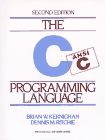 |
The C Programming Language (2nd ed.)Brian W. Kernighan & Dennis RitchiePrentice Hall ISBN: 0-13-110362-8 This is the second edition of the original Kernighan & Ritchie (K&R) text. This book is commonly referred to as the New Testament as it includes the modifications incorporated by the ANSI standard, while retaining the nature of the 1st edition. This book assumes that the reader has some basic programming knowledge. So if you're just starting to program and C is the first language, this might not be the ideal book. This is one of THE BEST books on C and a must have, especially if you're starting your own little programming library. |
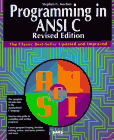 |
Programming in ANSI C (Revised edition: 1994)Kochan, StevenSAMS Publishing ISBN 0-672-30339-6 This book by Steve Kochan is absolutely the best book for anyone starting out programming in C. This is an excellent introductory text with frequent examples and good text. This book makes no assumptions about the particular computer system or operating system on which the C language is implemented. This books is written for novices and experienced programmers alike. I love this book as the comprehensive 'teach by examples' book can help you master the unique features of the C language. There is complete coverage of program looping, decision making, arrays, strings, pointers and bit operations and helpful end-of-chapter exercises. This is the book I used to learn C and it really is a great book. The K&R book is really great as a reference, but not as the first book. |
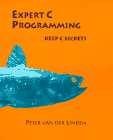 |
Expert C Programming: Deep C SecretsPeter Van Der LindenSunSoft Press. (ISBN 0-13-177429-8) Peter has written one of the greatest books to hit the computer book stands in a long time! This is not your typical C book, but is rather a fun book to read. As I told Peter, most C programming texts are really boring as all they do is describe the functions, give a abstract example and then move onto something different. This book is chock full of real world C stories and folklore, including a story about the C bug that brought down the AT&T network. I found the tongue-in-cheek attitude and real world examples/stories very, very interesting. Run, don't walk, down to your local store and buy this book. I really really loved this book, and I read most of it in one sitting. There is also a great introduction to C++ for C programmers that will get you started with C++ and Object-Oriented programming. This book is not for beginners, but is a great second book on C. Expert C Programming is also ideal for those C programmers who want to move to C++. According to the author, the book puts the "fun" back in "functions" :) PS: I'm a big fan for Peter's book and if you're a Java
programer, I would recommand buying any of his books. Peter's
Other books from Peter
|
 |
Microsoft C Bible. 1990 (2nd ed.)Waite Group Staff.Howard W. Sams & Company. ISBN 0-672-22620-0 This book is a must for every programmer, especially those who program in the DOS environment. The Bible organizes and simplifies the information contained in Microsoft's C library. Each function page gives the purpose, syntax, example call, includes, common uses, returns and examples. The book also has compatibility check boxes, so you can be sure your program compiles with the Microsoft C v5.0-7.0, Microsoft Quick C, Borland Turbo C and UNIX system V compilers. |
 |
The C++ Programming Language (2nd edition)Bjarne StroustrupAddison Wesley (ISBN 0-201-53992-6) Bjarne Stroustrup is the designer of C++ and has written 2 great books on C++. This book is divided into three parts: The first part provides a tutorial introduction to C++. The second part presents a discussion of design and software development issues arising in connection with the use of C++ and the third part is a complete reference manual. With the popularity of C++, several independent distributions of C++ have come forward, but the book discusses 'pure C++;' that is, no implementation dependent extensions are used. I have been programming in C++ for a while and yet found this book very helpful. One of the best way to learn a programming language is by writing small programs relevant to the item you study. There are exercises at the end of each chapter to test/apply what you learned in that particular chapter. This wasn't the book I used to learn C++ and I only recently got it from DEC [DEC ships this book with their C++ compiler in lieu of real documentation :)], but I wish I had gotten it sooner. This is really a great book and worth every penny. |
 |
C++ Primer (2nd edition)Lippman, Stanley BAddison Wesley ISBN 0-201-54848-8 The C++ Primer is a great book and will make learning C++ a joy. This really is one of the best books C++ book out there, but it assumes a lot of familiarity with programming concepts and a proficiency in C. Everyone I know who uses C++ recommends this book very highly. If you are interested in learning more about Object Oriented Program, you might consider buying Object Oriented Design by Peter Coad and Edward Yourdon (ISBN 0-13-630070-7) |
<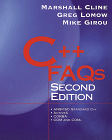 |
C++ FAQs: Frequently Asked QuestionsMarshall P. Cline, Greg A. Lomow & Mike GirouAddison-Wesley ISBN 0201309831 When I first heard about the book, it thought it would just be a reprint of the electronic version of the FAQ, but I was pleasantly surprised when I got my hands on the book (Thanks Deborah) This is no mere reprint. This is a *great great* book that contains answers to about 500 questions on programming, design, analysis and testing. This book is not for beginners, but for programmers who have figured out the syntax of the language, and are looking to implement them. If you have questions like "What is a class invariant?", "How should I use exceptions?", "What happens when a destructor is executed?", then this is the book for you. This is a very practical book that contains answers to some real-world programming questions that will really help anyone involved with software development. I just wish I had this book around when I was taking my C++ classes. Unlike other books, this book contains about 200 complete program rather than code snippets that leave you guessing about the implementation. This book is a definite jem and should be in every single programmers library. Go out and buy 2 copies of this book: One for the office and one for the nightstand at home. |
 |
Learn C++ on the MacintoshDave MarkAddison-Wesley ISBN 0-201-62204-1 This book comes with a customized version of Symantec C++ for the Macintosh. In addition, there is a coupon for obtaining the complete version of Symantec C++ at a much reduced price. I would recommend this book for those who are just beginning to program in C++; however, it does assume at least a working knowledge of C. There is a quick review of C at the beginning. Dave Mark also has a book 'Learn C on the Macintosh'. It has the same great style and comes highly recommended. Thanks Lizann Bolinger. |
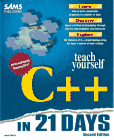 |
Teach yourself C++ programming in 21 daysJesse LibertySams ISBN 0-672-39541-0 This is another great book using the proven techniques of the Teach Yourself series. This essential guide teaches users how to write programs in a matter of days and is an ideal way for C programmers to move to the world of Object-Oriented programming and C++. The only way to learn to program is to write code. With this guide you'll be writing programs in just a matter of days. |
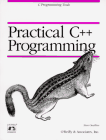 |
Practical C++ ProgrammingSteve QuallineO'Reilly ISBN 1-56592-139-9 Fast becoming the standard language of commercial software development, C++ is an update of the C programming language, adding object-oriented features that are very helpful for today's larger graphical applications. Practical C++ Programming is a complete introduction to the C++ language for the beginning programmer, and also for C programmers transitioning to C++. Unlike most other C++ books, this book emphasizes a practical, real-world approach, including how to debug, how to make your code understandable To others, and how to understand other people's code. Almost as important, this book is written in the readable style that
has made Nutshell Handbooks(R) famous. Topics covered include:
Practical C++ Programming describes standard C++ features that are supported by all UNIX C++ compilers, including gcc, DOS/Windows and NT compilers including Microsoft Visual C++, and Macintosh compilers. |
Conclusion:
- C is a great programming language that can make programming a lot of fun.
One of the best ways to learn is by taking a programming class. See if you can
take a class at your school, or take a class at night school. Programming in C
is a skill that could end up saving you your job or help you get a better job.
I hope these tutorials help you in your quest to learn the C language.
I welcome comments, suggestions or criticism for all the people out there on the net that read this. If you can help me make this list a little better, you will be helping a lot of people out there on the net. If you find any errors or would like to suggest any additions please feel free to email me.
Acknowledgments:
- Steve Summit (scs@eskimo.com)
Lizann Bolinger (bolinger@zeno.ibd.nrc.ca)
Blake Sobiloff (sobiloff@mail.lap.umd.edu)
Alex Wu (wua@cpsc.ucalgary.ca)
Ian Jackson (ijackson@nyx.cs.du.edu)
Peter Vanderlinden (Peter.Vanderlinden@eng.sun.com)
Robin Schogol (rschogol@lehman.com)
Adam Roach (exuadam@exu.ericsson.se)
Marcus Speh (marcus@x4u.desy.de)
Jutta Degener (jutta@cs.tu-berlin.de)
List of C tutorials Last Update: 12/26/1999
Compiled By: Vinit Carpenter
- vin@cyberdiem.com
Note that this document is provided as is. The
information in it is not warranted to be correct; you use it at your own
risk.
The LEARN C/C++ TODAY List is Copyright © 1996 by Vinit S. Carpenter (vin@cyberdiem.com). It may be reproduced and distributed in whole or in part, subject to the following conditions:
- This copyright and permission notice and the paragraph in the introduction about the frequency of updates must be retained on all complete or partial copies.
- Any translation or derivative work must be approved by me before distribution. Email me - I'll will be happy to oblige !
- If you wish to charge for non-machine-readable copies you need my approval before distribution. Note that this restriction is not intended to prohibit charging for the service of printing or copying a document supplied by your customer.
- If you distribute partial copies of this list, instructions for obtaining the complete version must be included, and a means for obtaining a complete version free or at cost price provided.
- Exceptions to these rules may be granted, and I shall be happy to answer any questions about this copyright --- Simply e-mail me. These restrictions are here to protect the contributors, not to restrict you as educators and learners.
- Vinit Carpenter asserts the right to be identified as the author of this work, and claims the moral rights of paternity and integrity, in accordance with the Copyright, Designs and Patents Act, 1988.

